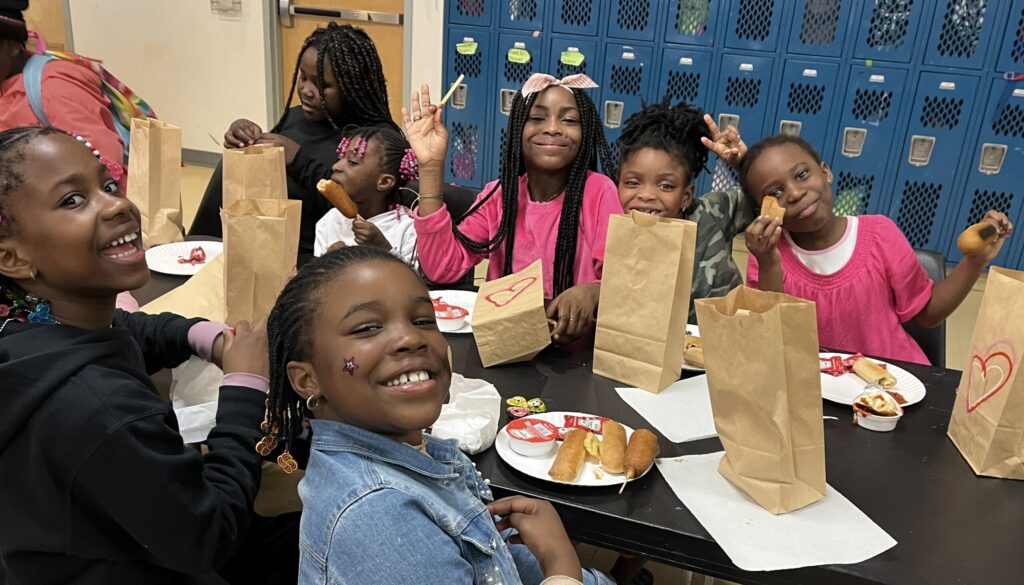Partnership between Maine Health and the Boys & Girls Club of Southern Maine expands children’s access to mental health support

When you walk through the doors of the Boys & Girls Club of Southern Maine’s Portland clubhouse, these are a few things you may notice. A posted schedule clearly communicates the activities of the day. A child who wins a game is getting a high five instead of an ice-cream treat. Staff are taking extra time to talk to a club member about their behavior so they can rejoin an activity.
These observations may seem subtle. But for a child who has experienced trauma, adversity, or mental health challenges, they may make all the difference. The schedule offers predictability for children who regularly encounter instability in their lives. The child who loses the game isn’t reminded of the food insecurity they face at home. Instead of missing out, the club member has an opportunity to learn healthier ways to engage while deepening a connection to a caring adult.
These evidence-based practices – and many others – have been implemented over the last few months as part of an innovative partnership between MaineHealth and the Boys & Girls Club of Southern Maine.
To test new strategies for supporting children’s mental health, the John T. Gorman Foundation has provided a grant to embed a full-time clinical social worker at the Portland clubhouse. Under the clinical supervision of MaineHealth, LCSW Jaycie Conkin is working to provide low-barrier direct mental health support to club members while helping to create a trauma-informed culture that fosters resiliency and healing.
“It is about providing a place where there is safety, consistency, empowerment, compassion, and understanding,” said Conkin of the changes she has led since coming to the clubhouse last July. “There are kids who absolutely need that every day to feel safe and come in these doors.”
The partnership comes amid growing concern over the mental health and well-being of young Mainers, which has worsened since the COVID-19 pandemic. One in six Maine children ages 3-17 have been diagnosed with anxiety – one of only three states with a rate above 15%. And 6% have depression, compared to 4.2% nationally. In addition, 20% of Maine children have experienced two or more Adverse Childhood Experiences, putting them at increased risk of developing mental health conditions.
At the same time, high demand for mental health services and low capacity have created many challenges to accessing care, especially for children and youth. There are not enough mental health providers for those in need, treatment costs are prohibitive for many families, and school-based counselors have rising caseloads.
As organizations and the state pursue efforts to expand the capacity of Maine’s behavioral health system, the partnership at the Portland clubhouse seeks to test the effectiveness of additional paths to support.
One aspect of the approach is giving children the opportunity to connect with a mental health professional, in a familiar setting where they may feel more comfortable opening up. Conkin is a constant presence at the club, greeting children by name, working with them as behavioral issues arise in the moment, and helping them build skills around self-soothing and managing emotions. In the months ahead, she plans to deepen her clinical work by starting counseling groups and meeting with children one on one.
“Integrating a clinician into a community setting has been around for a long time, but not in this way, necessarily,” said Rebecca Hoffmann, Director of the MaineHealth Center for Trauma, Resilience, and Innovation. What makes this approach unique, she said, is that in addition to offering clinical support to individuals, Conkin is also working with the club to create a culture of mental well-being. This upstream approach aims to mitigate or prevent the long-term issues that children with adversity may face without the right support.
“How can we help the most kids who need it?” Hoffmann asked. “By changing the environment.”
To that end, Conkin’s efforts have focused on making the cultural and operational changes needed to ensure all children at the club feel safe, welcome, and supported. She has worked with staff to strengthen their understanding of trauma-informed approaches, help them deal with behavioral issues in new ways, and support their efforts to create meaningful relationships with the children. She has opened new pathways of communication to foster consistency and predictability. And she has recommended changes in practice – like no longer using food as prizes or incentives – to avoid situations that could possibly remind children of the trauma they have faced.
Jennifer Burns, Senior Vice President of Operations at the Boys & Girls Club of Southern Maine, said the changes have helped strengthen the club’s ongoing work to support healthy youth development. The Portland clubhouse serves many children from asylum-seeking families and is just down the street from the city’s family shelter. In better equipping staff to understand the adversity these children may face in their day-to-day lives, and creating a calmer environment overall, Burns said these interventions have allowed children to engage more meaningfully with programming and staff.
Hoffmann said these positive relationships and experiences bring benefits that will last long after a child leaves the clubhouse.
“Providing safety and connections to caring adults are huge interventions and points of healing for kids who have been exposed to trauma and adversity,” she said. “You are helping them build well-being and resilience.”



